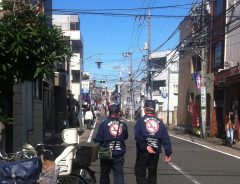
Source: "dragon demon tattoo" by ddmatt31 is licensed under CC BY-ND 2.0
What Do Japanese People Think About Tattoos?
- Tags:
- hajichi / Hellotalk / Irezumi / japanese tattoo / Manners / opinion poll / Tattoos
Related Article
-

The ultimate penalty for inconsiderate owners who don’t pick up their pet’s poo [manga]
-

Tips for smokers in 21st century Japan
-

Japanese man lends charger to high school girl and gets something unexpected in return
-

Rowdy Rugby World Cup Fans Cause Crowd Surfing Stir On Tokyo Train
-

Third of Service Industry Workers Banned from Wearing Masks Despite Coronavirus Outbreaks
-

Rigid Rules Of Japanese Drinking Parties Broken Up By A Special A.I. Powered Fan–And Delicious Beer[PR]


Tattoos NG at gyms in Japan
Last week, a friend of mine, a 22-year-old undergrad student at Kyoto University of Art and Design, wanted to join the neighborhood gym. I was excited because if I referred her, I thought I’d get some kind of reward. Also, it’s great that my friend wanted to get in shape, of course.
She went through the process of signing up for a one-day trial, filled out the papers, got a tour of the gym, and had her BMI assessed. So far so good. Then she got on the treadmill and minded her own business for about twenty minutes. So I was surprised when she came up to me a little while later and said she was headed home.
“Someone reported that I have a tattoo,” she told me plainly. Apparently, the staff had asked her if she has any tattoos and she admitted she does, but they said as long as she kept it covered it shouldn’t be a problem. Unfortunately, that wasn’t the case, because one of the gym-goers spotted her tattoo at some point and dutifully told the staff about his findings.
You can see the tattoo in question below:
Photo received with permission to publish
I personally do not have any tattoos. I’ve considered getting a tattoo a few times, but I always opted to save the money and travel or spend it in some other way. And since coming to Japan, I’ve felt a bit relieved. More than a few times my tattooed friends have turned down a trip to the public bath or a hot springs vacation because they say it’s too much trouble.
On the other hand, my first time going to a bathhouse was with an American covered with images of the Buddha, Tibetan tigers, and a Kanagawa-like wave cascading down from his shoulder. Although it was in Tokyo, I often hear that if you simply ask the bathhouse staff, they might not mind and let you soak your loins with everybody else.
Opinion poll: What do Japanese think about tattoos?
Perhaps because I have become friends with a number of the staff and other people training at my gym, this incident hit a bit close to home and got me a bit annoyed. So I took to Hellotalk (a language exchange app) and recounted my friend’s trouble, asking for everyone’s opinion. My posts usually receive a few likes and no replies, so the number and variety of responses tell me that this is a hot topic among Japanese.
Japanese FOR tattoos
"Irezumi - Horiyoshi III" by Thirsty in LA is licensed under CC BY-NC-ND 2.0
Ai, 31, a dancer in Osaka, associates with a lot of musicians, artists, and spiritually minded people with tattoos. But she says one of her close guy friends warned her from getting a tattoo:
She has tattoos now (see below) and can go to hot springs with no problem. “No one really seems to care, or they just don’t want to stare at another woman’s naked body,” she laughed.
Photo received with permission to publish
Japanese AGAINST tattoos
There were many other similar opinions, but also people who spoke out against tattoos.
When I asked Getty if he thought the same about a girl with a Pikachu or flowers on her arm, his answer was still the same.
Masaki, a 37-year-old professor simply stated:
One man in his late forties living in Northern Japan was very emphatic:
Another woman in her late forties in Hokkaido also voiced her anxiety at seeing a tattooed woman at a gym or hot springs.
Traditional Tattoos in Japan
One 32-year-old who wished to remain anonymous said his great-grandmother had a traditional “hajichi” style tattoo and was not associated with any criminal organizations. According to an article published by The Japan Times, hachiji 針突 was an Okinawan tradition of tattooing the back of women’s hands. This was during the time when Okinawa was known as the Ryukyu Kingdom (1429-1897). But after being incorporated into the Japanese empire at the end of the 19th century, tattoos were banned and many women were shamed.
Conclusion: Japan is not ready to embrace tattoos as a society
It is clear that public opinion on tattoos in Japan is split. Perhaps younger generations are more open to people with tattoos, but in most gyms, hot springs, and workplaces, tattoos are unacceptable. So what can you do if you have a tattoo? Well, my friend who was politely asked to leave the gym says her friend also has a tattoo, and simply didn’t report it to the staff. I’ve seen him a few times and now realize why he always wears sweatpants and a hoodie.
The best thing to do is simply be honest and ask the staff or owner of the establishment if tattoos are allowed. Often small shops are lenient, especially in more touristic locations where foreigners may be their main customers.